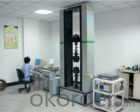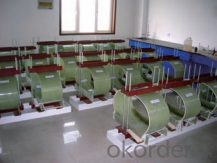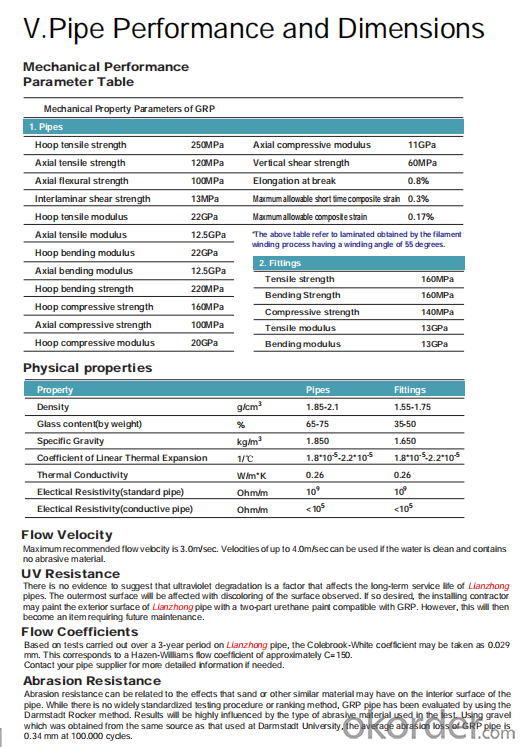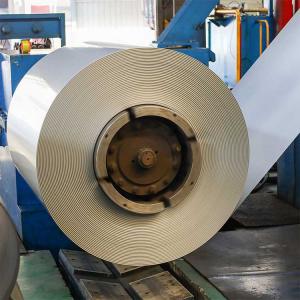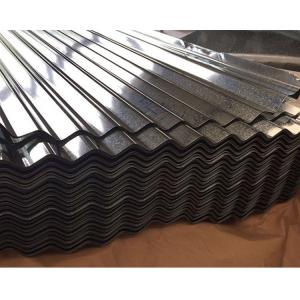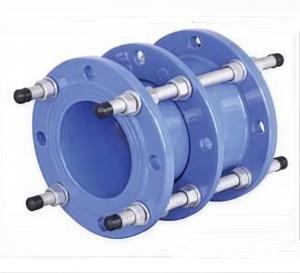Loading Port:Lianyungang
Payment Terms:TT OR LC
Min Order Qty:0 m
Supply Capability:5000 m/month
I.Product Advantages:
1.Corrosion-resistant
•Long, effective service-life materials
•No need for linings, coatings, cathodic protection, wraps or other forms of corrosion protection
•Low maintenance costs
•Hydraulic characteristics essentially constant over time
2.Light weight
(1/4 weight of ductile iron; 1/10 weight of concrete)
•Low transport costs (nestable)
•Eliminates need for expensive pipe handling equipment
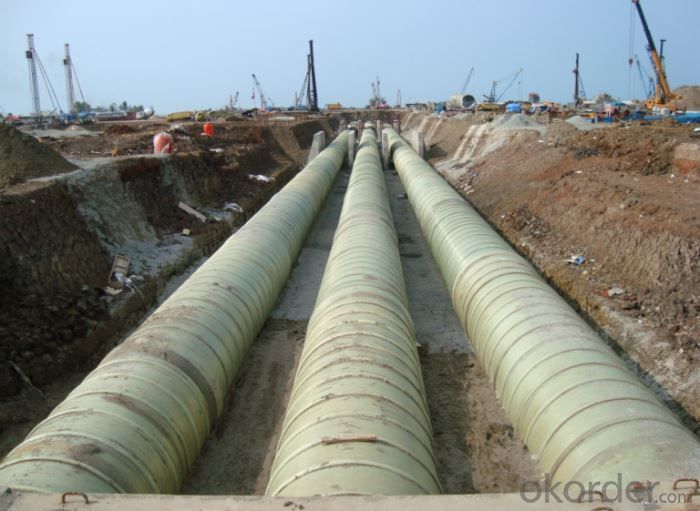
3.Long standard lengths
(6, 12 metres)
•Fewer joints reduce installation time
•More pipe per transport vehicle means lower delivery costs
4.Extremely smooth bore
•Low friction loss means less pumping energy needed and lower operating costs
•Minimum slime build-up can help lower cleaning costs
5.Precision sealability
With elastomeric rubber rings
•Tight, efficient joints designed for bell & spigot to eliminate infiltration and ex-filtration
•Ease of joining, reducing installation time
• Accommodates small changes in line direction without fittings or differential settlement
6.Flexible manufacturing
•Custom diameters can be process manufactured to provide maximum flow volumes with ease of installation for rehabilitation
lining projects
7.High technology pipe design
•Lower wave celerity than other piping materials can mean less cost when designing for surge and water hammer pressures
8.High technology pipe manufacturing system producing pipe that complies
to stringent performance standards (AWWA, ASTM, DIN, EN, etc.)
•High and consistent product quality worldwide which ensures reliable product performance
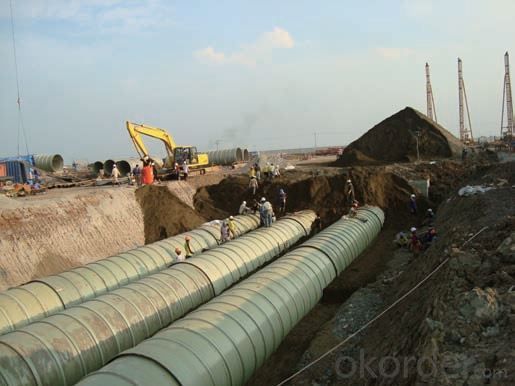
II.Performance Standards:
Standards developed by ASTM and AWWA are applied to a variety of fiberglass pipe applications including conveyance of sanitary sewage, water and industrial waste. A thread common to all of the product standards is that they are all performance based documents. This means that the required performance and testing of the pipe is specified.
ASTM
Currently there are several ASTM Product Standards in use which apply to a variety of fiberglass pipe applications.
All product standards apply to pipe with diameter ranges of 25 mm to 4000 mm and require the flexible joints to withstand hydrostatic testing in configurations (per ASTM D4161) that simulate exaggerated in-use conditions. These standards include many tough quali¬fication and quality control tests. Lianzhong pipe is designed to meet all of these ASTM standards.
ASTM | D3262 | Gravity Sewer |
ASTM | D3517 | Pressure Pipe |
ASTM | D3754 | Pressure Sewer |
AWWA
AWWA C950 is one of the most comprehensive product standards in existence for fiberglass pipe. This standard for pressure water applications has extensive require¬ments for pipe and joints, concentrating on quality control and prototype qualification testing. Like ASTM standards, this is a product performance standard.Lianzhong pipe is designed to meet the performance requirements of this standard. AWWA has recently issued a new standards manual, M-45, which
includes several chapters on the design and fabricate of GRP pipe for buried and aboveground installations.
AWWA | C950 | Fiberglass Pressure Pipe |
AWWA | M-45 | Fiberglass Pipe Design Manual |
CHINA STANDARD
Currently there are several China Standards in use for GRP pipe, such as GB21238、JC552、CECS190、CECS129, which basically equivalent foreign standard. The performance and design and burying of GRP pipe are specified by these standard. Lianzhong participated in the formulating of these standards.
GB21238 | Fiberglass pipe with sand filler |
JC552 | Fiberglass pressure pipe |
CECS190 | Fiberglass pipe Design Manual |
CECS129 | Fiberglass pipe Installation & Inspection Manual |
Others
Other standardization organizations such as BS and DIN have also published performance specifications for GRP pipes. Lianzhong pipe conforms to these standards’ performance requirements too.
DIN | 16868 | Glass Fiber-Reinforced Polyester Resin Pipes |
BS | 5480 | Pipes and Fittings for Water and Sewage |
III.Qualification Testing
A common element shared by all standards is the need for a pipe manufacturer to demonstrate compliance with the standards’ minimum performance requirements. In the case of GRP pipe, these minimum performance requirements fall into both short-term and long-term requirements. The most important of these and generally specified at the same level of performance in all the
previously defined standards is joint, initial ring deflection, long-term ring bending, long-term pressure and strain corrosion capability. Lianzhong pipe has been rigorously tested to verify conformance to the ASTM D3262, ASTM D3517, AWWA C950 and DIN 16868 requirements.
Strain Corrosion Testing
A unique and important performance requirement for GRP gravity pipe used in sewer applications is the chemical testing of the pipe in a deflected or strained condition. This strain corrosion testing is carried out in accordance with ASTM D3681, and requires a minimum of 18 ring samples of the pipe to be deflected to various levels and held constant. These strained rings are then exposed at the invert of the interior surface to 1.0N (5% by weight) sulphuric acid (see Figure 1). This is intended to simulate a buried septic sewer condition. This has been shown to be representative of the worst sewer conditions including those found in the Middle East, where many Lianzhong pipes have been successfully installed.
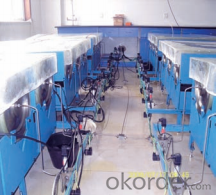
The time to failure (leakage) for each test sample is measured. The minimum extrapolated failure strain at 50 years, using a least squares regression analysis of the failure data, must equal the values shown for each stiffness class. The value achieved is then relatable to the pipe design to enable prediction of safe installation limitations for GRP pipe used for this type of service. Typically this is 5% in-ground long-term deflection.
Hydrostatic Design Basis - HDB
Another important qualification test is the establishment of the Hydrostatic Design Basis - HDB. This test is carried out in accordance with ASTM D2992 Procedure B and requires hydrostatic pressure testing to failure (leakage) of many pipe samples at a variety of very high constant pressure levels. As in the previously described strain corrosion test, the resulting data is evaluated on a log-log basis for pressure (or hoop tensile strain) vs. time to failure and then extrapolated to 50 years. The extrapolated failure pressure (strain) at 50 years, referred to as the hydrostatic design basis (strain) or HDB, must be at least 1.8 times the rated pressure class (strain at the rated pressure).
In other words, the design criteria requires that the average pipe be capable of withstanding a constant pressure of 1.8 times the maximum operating condition for 50 years. Due to combined loading considerations, that is the interaction of internal pressure and external soil loads; the actual long-term factor of safety against pressure failure alone is higher than 1.8. This qualification test helps assure the long-term performance of the pipe in pressure service.
Joint Testing
This important qualification test is conducted on joint prototypes for elastomeric gasket sealed bell and spigot joint. This is a severe test carried out in accordance with ASTM D4161. It incorporates some of the most stringent joint performance requirements in the piping industry for pipe of any material within the pressure and size ranges of Lianzhong pipe. ASTM D4161 requires these flexible joints to withstand hydrostatic testing in configurations that simulate very severe in-use conditions. Pressures used are twice those rated and 200 kPa (2 bar) is used for gravity flow pipe. Joint configurations include straight alignment, maximum angular rotation and differential shear loading. A partial vacuum test and some cyclical pressure tests are also included.
Initial Ring Deflection
All pipes must meet the initial ring deflection levels of no visual evidence of cracking or crazing (Level A) and no structural damage to the pipe wall (Level B) when vertically deflected between two parallel flat plates or rods.
Long-Term Ring Bending
AWWA C950 requires the test to be carried out, with the resulting 50-year predicted value used in the pipes’ design. Lianzhong pipe is tested using the guidelines of ASTM D5365 “Long-Term Ring Bending Strain of Fiberglass Pipe” and meets both requirements.
Potable Water Approvals
Lianzhong pipe has been tested and approved for the conveyance of potable water meeting many of the worlds’s leading authorities’ and testing institutes’ criteria, including:
● WRAS(Water Regulations Advisory Scheme)
● The license of drinking water safety products
